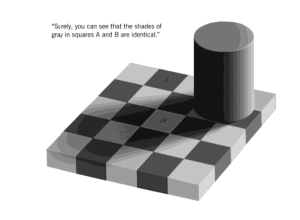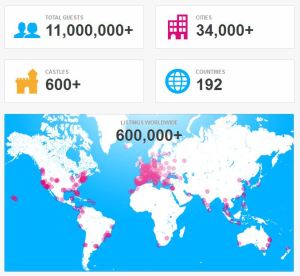Airbnb is a service that allows anyone to become a hotelier overnight. For any short period of time, members of Airbnb can list rooms, or an entire house or apartment, to complete strangers for rent. Users set up a profile that lets the potential guests see their name, picture, and images of the space available. “As of 2013, Airbnb has 300,000 listings, comparable in total size to Marriott’s 535,000 rooms worldwide.” (Edelman and Luca) Ben Edelman and Michael Luca analyzed information about Airbnb hosts in New York. What they found is not only painting a picture of significant racial biases on websites like Airbnb, but also is reflective of racism in our present society. Edelman and Luca found that “non-black hosts are able to charge approximately 12% more than black hosts, holding location, rental characteristics, and quality constant. Moreover, black hosts receive a larger price penalty for having a poor location score relative to non-black hosts.” (Edelman and Luca, 2014).
On Airbnb’s home page, they state that racism is prohibited, and that they are an “open market place” (Airbnb). Yet the problem still exists. The problem is implicit race bias. Implicit biases are our stereotypes and judgments towards certain people or groups that affect the way we think or act in an unconscious way. Implicit biases could cause a person to act favorably towards a certain group of people, or very unfavorably, without the person even being aware of their actions. Because these biases are buried deep in our subconscious a person cannot find them, hide them, or control them (Kirwan Institute, 2014).
Mahzarin R. Banaji and Anthony G. Greenwald explore this phenomenon in their book Blind spot: Hidden Biases of Good People. One test Banaji and Greenwald ran was testing whether people preferred Oprah or Martha Stewart. They found people showed preference to Stewart even if they consciously insisted they preferred Oprah. (Banaji and Greenwald, xiii). This example shows us that our minds preferences are often out of our control. Even if a person is a diehard Oprah fan, he or she will implicitly favor Martha Stewart because she is white. Even though this idea seems far-fetched, Banaji and Greenwald show another example of how our minds can so easily trick us. In the diagram pictured below, Banaji and Greenwald urge readers to believe that the colors of block A and B are the same. This seems completely implausible. Yet, when you take a piece of paper and cut hole into where the squares are, hiding the rest of the image, the squares perfectly coordinate (Banaji and Greenwald, 8).

In the case of Airbnb, the power of implicit bias is revealed. One can also see the potential fallout of these sneaky biases. Users of the sight may not be trying to hold these biases, yet because they are clearly there, implicit biases are impeding the lives of African-Americans who depend on the revenue of Airbnb. Implicit biases do not only affect the lives of people using Airbnb. Implicit biases affect the lives of students and everyday people (see below-youtube video). This is why the issue must be addressed. Unfortunately, Airbnb had not done too much about the issue. This could be a result of the fact that the company had been enduring quite a bit of heat in the media as of lately. Last fall, the company was faced with a crackdown from the New York’s Attorney General, Eric Scheiderman, who claimed the company use of short term rentals was in violation with New York City laws (Stanley). The only response that Airbnb generated was to direct people to its website’s policy on racism (seen below).
It is hard to say what exactly can be done about this issue, because it would be hard to avoid profiles of hosts. Furthermore, it is even more difficult to try and control implicit biases. I think when it comes to implicit biases, the best thing Airbnb could do is to inform people that these biases exist. The discrimination page on their website simply states that discrimination of any kind is prohibited, but what if their users are not aware of the fact they are holding biases? Perhaps Airbnb could have a link to the implicit bias test (Link to test: https://implicit.harvard.edu/implicit/) so users could see their biases for themselves. I also think it would helpful to change the profile settings Airbnb has right now. Instead of showing the person’s profile picture, Airbnb could display the information about the person (i.e. their reviews) and the property before users are allowed to see the host’s picture. Therefore, potential guests would be choosing their host based on quality of hospitality not on looks.
Works Cited
Banaji, Mahzarin R., and Anthony G. Greenwald. Blindspot: Hidden Biases of Good People. New York: Delacorte, 2013. Print.
Edelman, Benjamin, and Michael Luca. “Digital Discrimination: The Case of Airbnb.com.” Harvard Business School (2014): n. pag. Web. 19 Jan. 2014. <http://www.hbs.edu/faculty/Publication%20Files/14-054_e3c04a43-c0cf-4ed8-91bf-cb0ea4ba59c6.pdf>.
“Life Cycles of Inequity: A Series on Black Men.” YouTube. YouTube, n.d. Web. 22 Sept. 2014.
Science:, State Of The. “Implicit Bias.” State of Science: Implicit Bias Review 2014 (n.d.): n. pag. 2014. Web. 19 Sept. 2014.
Stanley, Chuck. “Racial Profiling on AirBnB.” Reality Check NYC. N.p., 5 Feb. 2014. Web. 19 Sept. 2014.
“What Is Airbnb’s Position on Discrimination?” Vacation Rentals, Homes, Apartments & Rooms for Rent. N.p., n.d. Web. 22 Sept. 2014.



